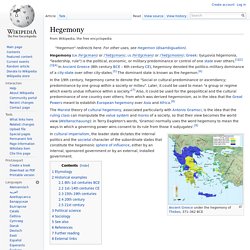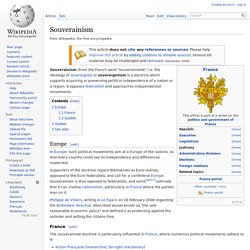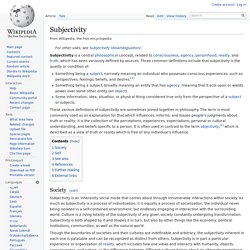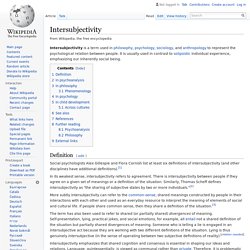

Encyclopedia Britannica. The 12 cognitive biases that prevent you from being rational. Determinism. Determinism is the philosophical position that for every event, including human action, there exist conditions that could cause no other event.

"There are many determinisms, depending upon what pre-conditions are considered to be determinative of an event. "[1] Deterministic theories throughout the history of philosophy have sprung from diverse and sometimes overlapping motives and considerations. Some forms of determinism can be empirically tested with ideas from physics and the philosophy of physics. The opposite of determinism is some kind of indeterminism (otherwise called nondeterminism). Other debates often concern the scope of determined systems, with some maintaining that the entire universe is a single determinate system and others identifying other more limited determinate systems (or multiverse). Separatism. For Wikipedia's meaning of separatism, see Separatism.

Separatism is the advocacy of a state of cultural, ethnic, tribal, religious, racial, governmental or gender separation from the larger group. While it often refers to full political secession,[1] separatist groups may seek nothing more than greater autonomy.[2] While some critics may equate separatism with religious segregation, racist segregation, or sexist segregation, some separatists argue that separation by choice is not the same as government-enforced segregation and may serve useful purposes.[3][4][5][6][7] Motivations[edit] Groups may have one or more motivations for separation, including:[8] Governmental responses[edit] Some governments suppress any separatist movement in their own country, but support separatism in other countries.
Encyclopedia Britannica. Hegemony. In the 19th century, hegemony came to denote the "Social or cultural predominance or ascendancy; predominance by one group within a society or milieu".

Later, it could be used to mean "a group or regime which exerts undue influence within a society. "[7] Also, it could be used for the geopolitical and the cultural predominance of one country over others; from which was derived hegemonism, as in the idea that the Great Powers meant to establish European hegemony over Asia and Africa.[8] The Marxist theory of cultural hegemony, associated particularly with Antonio Gramsci, is the idea that the ruling class can manipulate the value system and mores of a society, so that their view becomes the world view (Weltanschauung): in Terry Eagleton's words, 'Gramsci normally uses the word hegemony to mean the ways in which a governing power wins consent to its rule from those it subjugates'.[9] Etymology Historical examples 8th–1st centuries BCE 1st–14th centuries CE 15th–19th centuries 20th century.
Souverainism. Souverainism (from the French word "souverainisme", i.e. the ideology of sovereignty) or sovereigntism is a doctrine which supports acquiring or preserving political independence of a nation or a region.

It opposes federalism and approaches independentist movements. Europe[edit] In Europe, such political movements aim at a Europe of the nations, so that every country could see its independence and differences respected. Supporters of the doctrine regard themselves as Euro-realists, opposed to the Euro-federalists, and call for a confederal Europe. Souverainism is thus opposed to federalism, and some[who?] Philippe de Villiers, writing in Le Figaro on 16 February 2006 regarding the Bolkestein directive, described souverainism as "the sole reasonable economic policy" and defined it as protecting against the outsider and setting the citizens free.
Sovereignty. Sovereignty is understood in jurisprudence as the full right and power of a governing body to govern itself without any interference from outside sources or bodies.

In political theory, sovereignty is a substantive term designating supreme authority over some polity.[1] It is a basic principle underlying the dominant Westphalian model of state foundation. Derived from Latin through French souveraineté, its attainment and retention, in both Chinese and Western [2] culture, has traditionally been associated with certain moral imperatives upon any claimant. Different approaches[edit] The concept of sovereignty has been discussed throughout history, from the time before recorded history through to the present day.[3][4] It has changed in its definition, concept, and application throughout, especially during the Age of Enlightenment. The current notion of state sovereignty contains four aspects consisting of territory, population, authority and recognition.[5] According to Stephen D. Subjectivity. Society[edit] Subjectivity is an inherently social mode that comes about through innumerable interactions within society.

As much as subjectivity is a process of individuation, it is equally a process of socialization, the individual never being isolated in a self-contained environment, but endlessly engaging in interaction with the surrounding world. Intersubjectivity. Intersubjectivity is a term used in philosophy, psychology, sociology, and anthropology to represent the psychological relation between people.

It is usually used in contrast to solipsistic individual experience, emphasizing our inherently social being. Definition[edit] Social psychologists Alex Gillespie and Flora Cornish list at least six definitions of intersubjectivity (and other disciplines have additional definitions).[1] In its weakest sense, intersubjectivity refers to agreement. There is intersubjectivity between people if they agree on a given set of meanings or a definition of the situation. More subtly intersubjectivity can refer to the common-sense, shared meanings constructed by people in their interactions with each other and used as an everyday resource to interpret the meaning of elements of social and cultural life.
The term has also been used to refer to shared (or partially shared) divergences of meaning.